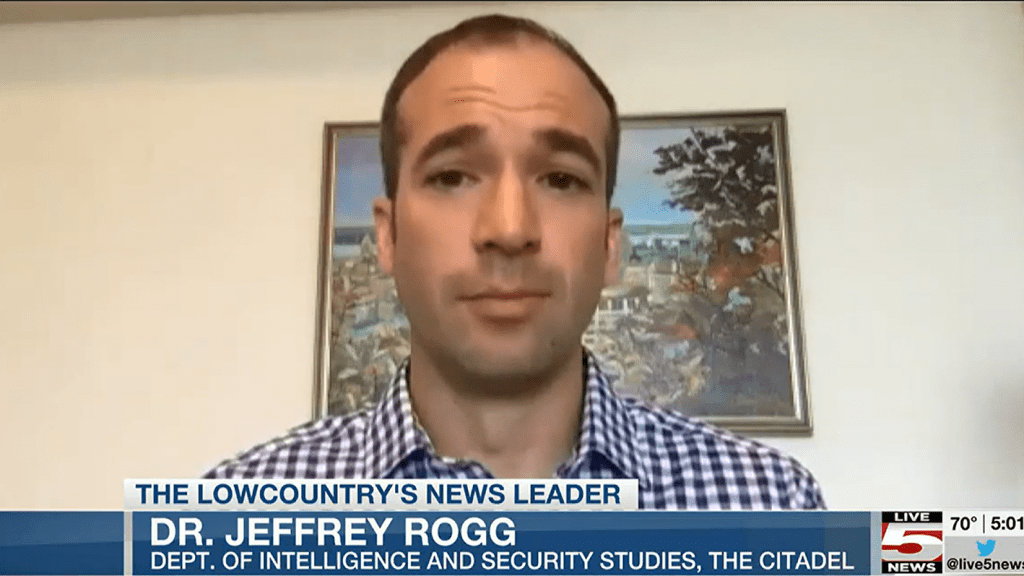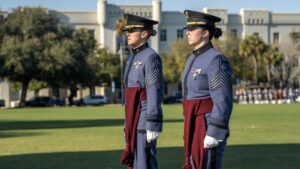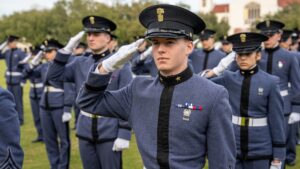
Photo: Dr. Jeffrey Rogg, a professor in the Department of Intelligence and Security Studies, during an interview with WCSC-TV on Wednesday, March 16.
Faculty answers call to contribute from media, community
Many of those working to fulfill the mission to educate and develop principled leaders at The Citadel, regularly demonstrate their own leadership by serving as contributing experts for media reports and community interests.
Members of the college’s five schools are often called upon for their insight expertise in a variety of fields. Jeffrey Rogg, Ph.D., a professor in the Department of Intelligence and Security Studies within the School of Humanities and Social Science is just one of many examples of the relevant and insightful expertise found on campus.
As the third week of the Russian invasion of Ukraine came to a close, Rogg spoke with WCSC-TV, the local CBS affiliate, to help viewers in the Lowcountry understand more about the war and what it could mean for the United States.
When asked about the motives behind the invasion, Rogg answered: “From Vladimir Putin’s view, he believes that the greatest tragedy to befall modern Russia was the collapse of the Soviet Union. Because of that, he’s been intent on not just restoring the Soviet Union or even the Russian Empire, but also the pride and the power of Russia.”
To see more of the coverage from Rogg’s interview with Live 5 News, click here.
“One of the many strengths of an education at The Citadel is the access to experts who can put critical global events – such as Russia’s war in Ukraine – into a wider context,” said Brian Madison Jones, Ph.D., dean of The Citadel’s School of Humanities and Social Sciences. “As the Military College of South Carolina, we’re uniquely positioned to help our cadets, students and community understand what is currently happening and what it means.”
Throughout multiple newscasts, Rogg discussed the historical context for the invasion, what a no-fly zone would entail, how the war could affect the American economy and a range of other topics.
“Within the School of Humanities and Social Sciences, professors from the Departments of Intelligence and Security Studies, Political Science and History, including military history, are studying these events in real time for use in the classroom and offering expert insight and analysis to help the next generation of leaders understand and address the great challenges of today and tomorrow,” Jones said.
Other examples of The Citadel faculty in the news
Shankar Banik, Ph.D.
Department of Cyber and Computer Sciences – Swain Family School of Science and Mathematics
South Carolina National Guard attends Cyber Boot Camp at The Citadel
DVIDS
Conference series helps Army identify U.S. infrastructure risks
The Watch
Hee Yoon Kwon, Ph.D.
Department of Marketing, Supply Chain Management and Economics – Tommy and Victoria Baker School of Business
The continuing supply chain saga
South Carolina Public Radio
Side effects of pipeline shutdown linger in Lowcountry
WCIV – ABC News 4
David Preston, Ph.D.
Department of History – School of Humanities and Social Sciences
Citadel professor curates new perspectives on Revolutionary War
Moultrie News
When young George Washington started a war
Smithsonian Magazine
John Weinstein, Ph.D.
Department of Biology – Swain Family School of Science and Mathematics
Tires: The plastic polluter you never thought about
National Geographic
Citadel experiment will analyze how PPE degrades in coastal environments
The Post and Courier
John Zardus, Ph.D.
Department of Biology – Zucker Family School of Science and Mathematics
Some barnacles can more around to improve feeding position
The Scientist
For information about joining the South Carolina Corps of Cadets, click here.
To learn more about non-cadet undergraduate and graduate programs offered by The Citadel, click here.

 Prestigious Cincinnati and MacArthur awards presented to Citadel cadets
Prestigious Cincinnati and MacArthur awards presented to Citadel cadets Looking ahead to the major events of 2026-27
Looking ahead to the major events of 2026-27 Photos from campus: January in review
Photos from campus: January in review

